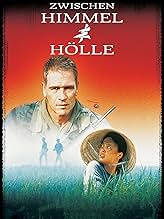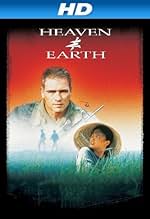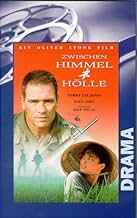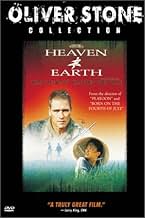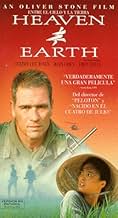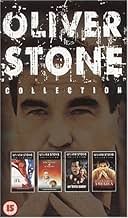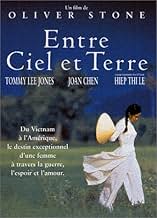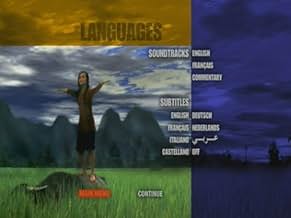IMDb रेटिंग
6.8/10
16 हज़ार
आपकी रेटिंग
वियतनाम युद्ध के दौरान, एक वियतनामी महिला सड़कों पर धंधा करती है, जहाँ उसका सामना अपने इर्द-गिर्द संघर्ष में शामिल लोगों से होता है.वियतनाम युद्ध के दौरान, एक वियतनामी महिला सड़कों पर धंधा करती है, जहाँ उसका सामना अपने इर्द-गिर्द संघर्ष में शामिल लोगों से होता है.वियतनाम युद्ध के दौरान, एक वियतनामी महिला सड़कों पर धंधा करती है, जहाँ उसका सामना अपने इर्द-गिर्द संघर्ष में शामिल लोगों से होता है.
- पुरस्कार
- 1 जीत और कुल 2 नामांकन
फ़ीचर्ड समीक्षाएं
This is the last film in Oliver Stone's trilogy about the Vietnam war (the other two are 'Platoon' and 'Born on the 4th of July'). It is also the least known. A shame really; not only is it an excellent film, but it is also one of the very few films that show the Vietnam war from the perspective of the Vietnamese (and from a woman, at that - which makes it even rarer). Impressive, shocking, sad and beautiful - and educating. 8 stars out of 10.
In case you're interested in more underrated masterpieces, here's some of my favorites:
imdb.com/list/ls070242495
In case you're interested in more underrated masterpieces, here's some of my favorites:
imdb.com/list/ls070242495
As the third part of an unofficial trilogy of Vietnam films, Stone picked as the final point a good challenge for himself as making a film not only from a woman's point of view (1st time), but from the side of the "enemy" of the war he and Kovic fought in. Of course Vietnamese people were seen in Platoon and Born on the Fourth of July, but always as the "other", either in limited roles as the so-called enemy or as tragic figures of oppression. And yet despite opening during the Christmas season, it failed to connect with audiences.
Seeing it now, finally, I can see why in some part; people from the West, Americans especially, wouldn't necessarily be interested in the point of view of someone who was on the side of the 'other', whether it's oppressor or oppressed (despite the attempted selling of the film on Tommy Lee Jones, audiences probably knew better that he wasn't the full star, more on him in a moment). It's one thing to see the point of view from the side of Americans, but for the other it's a tougher pill to swallow (maybe the exception is Letters from Iwo Jima, maybe), despite years after things are over and the wounds are beginning to heal. Maybe there's another aspect that is difficult to pinpoint but I could see it as Stone's, shall one say, spiritual side coming through which is his Buddhism, which is the religion of the protagonist Le Ly. How does one fully forgive and go for the belief in karma and past lives and so on?
For me, this is a film that I could connect to simply on the grounds of it being a human portrait of a life lived through many, many beats. And in a way it makes sense from how the life story is told that it's the third part of a trilogy which began as a story of someone's life in the short term (the stint in combat), somewhat longer (from youth to awakening as a man full circle), and here it's from childhood to further as an adult. The life of Le Ly is at times dramatic... no, actually, it's brutal and unrelenting in its grimness. Le Ly's village is decimated and torn apart by war (not simply the Americans, though they certainly leave their mark, but the division between the two sides of the Vietnamese who bring equal hardship and misery and torture to Le Ly), and then when she has to leave with her mother to Saigon, as the story would say, "my troubles were about to begin".
I'm tempted to say the first half of this may be TOO dramatic, in a sense, that things keep being thrown at Le Ly's way one after another: torture, rape, becoming an unwed mother on the streets, a dying (soon after dead) father, as well as a brother who was sent off to war and died. When I say 'heavy' it's more like an anvil is dropped. This is not to say the tone is always so heavy as far as being over-bearing - the emotion that's poured out in scene after scene by Hiep Thi Le is incredible, showing so much through her eyes as many a great actor can do. I think part of is is simply through Oliver Stone being... Oliver Stone, this coming as the "cool-off" between JFK and Natural Born Killers, so you can expect sometimes unwieldy camera-work and black and white flashbacks and the sort of intense lighting and compositions from Robert Richardson that, in a way, feel a little more out of place this time than in other Stone films of the period. The attempts to amplify the tension and horror (with the exception of one image, a big shock of fire going across the screen) are too much this time and clash with the otherwise strong, pretty straightforward direction of the dramatic scenes.
Then we get into the second half when Tommy Lee Jones comes in, and it becomes a stronger picture. But his part in the film as well as everything that comes after does only work with that first half, if that makes sense; everything that Le Ly has endured and experienced, every moment that's forced her to be less foolish or ignorant or slow to understand something or naive makes her stronger so that when a strong, seemingly kind and generous man like Jones' Steve comes in, we get it. We know why she puts her guard up and why it goes down. And for Jones' part, as he has an arc as well as a man with a slowly-but-surely deteriorating veneer of strength through years of being a f***ed up "Psy-Ops" guy, he gives the performance that I'll just pretend he won the Oscar for in 94 instead of the Fugitive. It's really among his major performances, certainly one of the ones he should be remembered for, creating this man Steve as an engaging, fun, terrifying, wounded, tragic figure in Le Ly's life.
I think that if Stone had reeled in some of his crazier stylistic tendencies of the period - he does, mostly, but not enough - and perhaps cut a little out (at 140 minutes it feels too long, mostly near the end, however necessarily in general it may be to complete Le Ly's arc), it would've been a film to stand with the rest of his work for the time. But as far as underrated films from a major director, this is one that is deeply felt and reveals someone who can deliver an experience outside of his usual worldview. At the same time it works as a feminist picture, a story of a woman making her own life on her own terms, while the spiritual side of things is always there. Though I wanted to like it more, I'd say if you want to finish Stone's oeuvre you won't be disappointed.
Seeing it now, finally, I can see why in some part; people from the West, Americans especially, wouldn't necessarily be interested in the point of view of someone who was on the side of the 'other', whether it's oppressor or oppressed (despite the attempted selling of the film on Tommy Lee Jones, audiences probably knew better that he wasn't the full star, more on him in a moment). It's one thing to see the point of view from the side of Americans, but for the other it's a tougher pill to swallow (maybe the exception is Letters from Iwo Jima, maybe), despite years after things are over and the wounds are beginning to heal. Maybe there's another aspect that is difficult to pinpoint but I could see it as Stone's, shall one say, spiritual side coming through which is his Buddhism, which is the religion of the protagonist Le Ly. How does one fully forgive and go for the belief in karma and past lives and so on?
For me, this is a film that I could connect to simply on the grounds of it being a human portrait of a life lived through many, many beats. And in a way it makes sense from how the life story is told that it's the third part of a trilogy which began as a story of someone's life in the short term (the stint in combat), somewhat longer (from youth to awakening as a man full circle), and here it's from childhood to further as an adult. The life of Le Ly is at times dramatic... no, actually, it's brutal and unrelenting in its grimness. Le Ly's village is decimated and torn apart by war (not simply the Americans, though they certainly leave their mark, but the division between the two sides of the Vietnamese who bring equal hardship and misery and torture to Le Ly), and then when she has to leave with her mother to Saigon, as the story would say, "my troubles were about to begin".
I'm tempted to say the first half of this may be TOO dramatic, in a sense, that things keep being thrown at Le Ly's way one after another: torture, rape, becoming an unwed mother on the streets, a dying (soon after dead) father, as well as a brother who was sent off to war and died. When I say 'heavy' it's more like an anvil is dropped. This is not to say the tone is always so heavy as far as being over-bearing - the emotion that's poured out in scene after scene by Hiep Thi Le is incredible, showing so much through her eyes as many a great actor can do. I think part of is is simply through Oliver Stone being... Oliver Stone, this coming as the "cool-off" between JFK and Natural Born Killers, so you can expect sometimes unwieldy camera-work and black and white flashbacks and the sort of intense lighting and compositions from Robert Richardson that, in a way, feel a little more out of place this time than in other Stone films of the period. The attempts to amplify the tension and horror (with the exception of one image, a big shock of fire going across the screen) are too much this time and clash with the otherwise strong, pretty straightforward direction of the dramatic scenes.
Then we get into the second half when Tommy Lee Jones comes in, and it becomes a stronger picture. But his part in the film as well as everything that comes after does only work with that first half, if that makes sense; everything that Le Ly has endured and experienced, every moment that's forced her to be less foolish or ignorant or slow to understand something or naive makes her stronger so that when a strong, seemingly kind and generous man like Jones' Steve comes in, we get it. We know why she puts her guard up and why it goes down. And for Jones' part, as he has an arc as well as a man with a slowly-but-surely deteriorating veneer of strength through years of being a f***ed up "Psy-Ops" guy, he gives the performance that I'll just pretend he won the Oscar for in 94 instead of the Fugitive. It's really among his major performances, certainly one of the ones he should be remembered for, creating this man Steve as an engaging, fun, terrifying, wounded, tragic figure in Le Ly's life.
I think that if Stone had reeled in some of his crazier stylistic tendencies of the period - he does, mostly, but not enough - and perhaps cut a little out (at 140 minutes it feels too long, mostly near the end, however necessarily in general it may be to complete Le Ly's arc), it would've been a film to stand with the rest of his work for the time. But as far as underrated films from a major director, this is one that is deeply felt and reveals someone who can deliver an experience outside of his usual worldview. At the same time it works as a feminist picture, a story of a woman making her own life on her own terms, while the spiritual side of things is always there. Though I wanted to like it more, I'd say if you want to finish Stone's oeuvre you won't be disappointed.
Oliver Stone has always had a special bond with Vietnam. He is a veteran of that war and the theme about a veteran trying to cope with his war experiences is a subject that comes back in several of his movies. This is the last movie in his Vietnam trilogy. His first movie was "Platoon" (1986), his second "Born on the Fourth of July" (1989) and the third one was "Heaven & Earth" (1993).
In Heaven & Earth he tells the true story of a Vietnamese village girl who survives a life of suffering and hardship during and after the Vietnam war. Before she meets and marries the U.S. marine Steve Butler, she already has had an entire life behind her. She once fled for the violence of the Viet Cong, leaving her farming village for Saigon together with her mother. But soon she disgraced herself by becoming pregnant with her new master's child and as an unmarried mother, she tried to make a living by being a freedom fighter, a hustler and sometimes a prostitute. As soon as they are married, they move to the USA, but life on the other side of the ocean certainly isn't as perfect as she imagined it to be...
Some people say that it is a good thing that Oliver Stone has finally made a movie that shows the Vietnamese perspective of the war and I agree, but only to a certain extend. It's true that we only get to see movies that show the American side of the story and that we need other movies that give us a broader view on the matter, but "Heaven & Earth" isn't the only 'reversed' Vietnam film. Perhaps not many people know this, but the French movie "Indochine" (1992) does approximately the same. The main difference with "Heaven & Earth" is that it doesn't talk about the 'American' period, but about the French colonial period that proceeded it and in which time the Vietnam war really started (The French had almost lost all their battles when the Americans came to help them and thereby got completely stuck into the war themselves...).
But it is true, Oliver Stone has done a nice job with this movie. He has made it an interesting character study, with the war always present in the background. The acting is very good and I don't think there could have been a better actor than Tommy Lee Jones to play the role of Major Steve Butler. The other actors all did a good job too, in fact, I might say that Stone has had an excellent cast to work with and he probably got the most and the best out of them.
If there is one lesser point to this movie, although only a small one, than it must be the language. The Vietnamese all start by speaking almost perfect English to each other, but when they speak to Americans their English is poor, yet when they speak to each other in front of an American its in Vietnamese. I believe it would have been better if Stone had chosen to let the Vietnamese speak their own language all the time and to speak with an accent when speaking to the Americans. But as I already said, I only see this as a minor detail and it certainly didn't spoil the good times that I had with this movie. This is an underrated movie that deserves to be seen by a great audience. I give it a 7.5/10 at least, perhaps even an 8/10.
In Heaven & Earth he tells the true story of a Vietnamese village girl who survives a life of suffering and hardship during and after the Vietnam war. Before she meets and marries the U.S. marine Steve Butler, she already has had an entire life behind her. She once fled for the violence of the Viet Cong, leaving her farming village for Saigon together with her mother. But soon she disgraced herself by becoming pregnant with her new master's child and as an unmarried mother, she tried to make a living by being a freedom fighter, a hustler and sometimes a prostitute. As soon as they are married, they move to the USA, but life on the other side of the ocean certainly isn't as perfect as she imagined it to be...
Some people say that it is a good thing that Oliver Stone has finally made a movie that shows the Vietnamese perspective of the war and I agree, but only to a certain extend. It's true that we only get to see movies that show the American side of the story and that we need other movies that give us a broader view on the matter, but "Heaven & Earth" isn't the only 'reversed' Vietnam film. Perhaps not many people know this, but the French movie "Indochine" (1992) does approximately the same. The main difference with "Heaven & Earth" is that it doesn't talk about the 'American' period, but about the French colonial period that proceeded it and in which time the Vietnam war really started (The French had almost lost all their battles when the Americans came to help them and thereby got completely stuck into the war themselves...).
But it is true, Oliver Stone has done a nice job with this movie. He has made it an interesting character study, with the war always present in the background. The acting is very good and I don't think there could have been a better actor than Tommy Lee Jones to play the role of Major Steve Butler. The other actors all did a good job too, in fact, I might say that Stone has had an excellent cast to work with and he probably got the most and the best out of them.
If there is one lesser point to this movie, although only a small one, than it must be the language. The Vietnamese all start by speaking almost perfect English to each other, but when they speak to Americans their English is poor, yet when they speak to each other in front of an American its in Vietnamese. I believe it would have been better if Stone had chosen to let the Vietnamese speak their own language all the time and to speak with an accent when speaking to the Americans. But as I already said, I only see this as a minor detail and it certainly didn't spoil the good times that I had with this movie. This is an underrated movie that deserves to be seen by a great audience. I give it a 7.5/10 at least, perhaps even an 8/10.
I don't understand why this film has been rated so poorly, it really deserves better. The breath-taking landscapes, subtle imagery, the overall excellent craftsmanship alone make this movie worth seeing.
The unique and very personal perspective of this movie makes it hard to keep your distance. Some scenes are rather brutal, but these scenes are necessary for telling a realistic story. Definitely no Disney family movie though.
I give it a 9 out of 10, because even with 140 minutes runtime the story feels rushed and crammed. Sometimes less is more, I shall read the books now.
The unique and very personal perspective of this movie makes it hard to keep your distance. Some scenes are rather brutal, but these scenes are necessary for telling a realistic story. Definitely no Disney family movie though.
I give it a 9 out of 10, because even with 140 minutes runtime the story feels rushed and crammed. Sometimes less is more, I shall read the books now.
As he did with his first two Vietnam films, "Platoon" and "Born on the 4th of July", Oliver Stone creates a powerful tale of the devastation of the Vietnam War. What makes this movie so unique, both from Stone's earlier work and virtually every other American movie about the Vietnam War, is that "Heaven and Earth" is told from the perspective of a Vietnamese woman. This movie is based on two books of memoirs written by Le Ly Hayslip, a Vietnamese woman who grew up in a simple farming village in central Vietnam but whose life --- and those of most Vietnamese people, we can infer --- is turned upside-down by the madness of the Vietnam War.
Strictly as a movie, this is a good but not great film. Even at almost 2 1/2 hours, the structure is a bit stilted in order to accommodate such an extensive story. The first 30 minutes are mostly voice-overs and the movie doesn't pick up steam until later, when scenes are allowed to flow for extended amounts of time and we become caught in the drama. Tommy Lee Jones gives another brutally realistic performance as a lifetime military man who can't leave the war behind. Hiep Thi Ly is okay as Le Ly Hayslip; not Tommy Lee Jones caliber acting, but she competently plays a very difficult role. I read she was an amateur actress only chosen after an extensive casting call, and I'm glad that they decided to go with an actual young Vietnamese woman instead of choosing a generic asian actress. It might not make a difference to most, but it certainly felt more "real" to me with an authentic Vietnamese-American in the main role. Oliver Stone shows his mastery of mood and camerawork as he jumps from the beauty of the Vietnam countryside, to the ravages of war, to the shocking (for Le Ly) wealth of suburban America. The movie occasionally drags but overall I'd still give it an 8 out of 10 because it's such a powerful and important addition to the cinematic depiction of the Vietnam War.
The movie also inspired me to read the 2 books ("When Heaven and Earth Changed Places" and "Child of War, Woman of Peace") it was based on. Stone had to compress many events in order to fit the run time; for example, the Tommy Lee Jones character is a fabrication based on 3 different men (and probably meshed into one man as much for the drama such an explosive character provides as for the time constraints), while her books spend extensive time on all 3 relationships. However, the dialogue for several key scenes were taken almost word for word from her books, and I thought it captured the spirit of the story remarkably well, especially for a major studio movie. I highly recommend anyone interested in the film or in the war to read these books, and I commend Oliver Stone for making a trilogy of important films not just for cinema, but for American history.
Strictly as a movie, this is a good but not great film. Even at almost 2 1/2 hours, the structure is a bit stilted in order to accommodate such an extensive story. The first 30 minutes are mostly voice-overs and the movie doesn't pick up steam until later, when scenes are allowed to flow for extended amounts of time and we become caught in the drama. Tommy Lee Jones gives another brutally realistic performance as a lifetime military man who can't leave the war behind. Hiep Thi Ly is okay as Le Ly Hayslip; not Tommy Lee Jones caliber acting, but she competently plays a very difficult role. I read she was an amateur actress only chosen after an extensive casting call, and I'm glad that they decided to go with an actual young Vietnamese woman instead of choosing a generic asian actress. It might not make a difference to most, but it certainly felt more "real" to me with an authentic Vietnamese-American in the main role. Oliver Stone shows his mastery of mood and camerawork as he jumps from the beauty of the Vietnam countryside, to the ravages of war, to the shocking (for Le Ly) wealth of suburban America. The movie occasionally drags but overall I'd still give it an 8 out of 10 because it's such a powerful and important addition to the cinematic depiction of the Vietnam War.
The movie also inspired me to read the 2 books ("When Heaven and Earth Changed Places" and "Child of War, Woman of Peace") it was based on. Stone had to compress many events in order to fit the run time; for example, the Tommy Lee Jones character is a fabrication based on 3 different men (and probably meshed into one man as much for the drama such an explosive character provides as for the time constraints), while her books spend extensive time on all 3 relationships. However, the dialogue for several key scenes were taken almost word for word from her books, and I thought it captured the spirit of the story remarkably well, especially for a major studio movie. I highly recommend anyone interested in the film or in the war to read these books, and I commend Oliver Stone for making a trilogy of important films not just for cinema, but for American history.
क्या आपको पता है
- ट्रिवियाIn the scene where Le Ly is in the jewelry store getting her jewelry appraised by the broker, the jewelry broker is the real Le Ly Hayslip.
- गूफ़When Steve picks up Le Ly and her kids when the south is being overrun, he flies in on an Army helicopter, despite the fact that he and his friends are all in the Marines.
- इसके अलावा अन्य वर्जनThe UK cinema and video release has been cut by 55 seconds to obtain a '15' certificate. Numerous scenes were affected, particularly the rape and torture shots. In Ireland, the uncut version also initially earned an '18'. It was re-submitted in its cut British version which yet again earned an '18'. This decision was then taken to the Films Appeal Board, who downgraded the certificate to '15' on 16th February 1994. The UK DVD carries an Irish '18' while the British certificate is '15'.
- कनेक्शनFeatured in Siskel & Ebert & the Movies: Tommy Lee Jones (1993)
टॉप पसंद
रेटिंग देने के लिए साइन-इन करें और वैयक्तिकृत सुझावों के लिए वॉचलिस्ट करें
- How long is Heaven & Earth?Alexa द्वारा संचालित
विवरण
बॉक्स ऑफ़िस
- बजट
- $3,30,00,000(अनुमानित)
- US और कनाडा में सकल
- $58,64,949
- US और कनाडा में पहले सप्ताह में कुल कमाई
- $3,79,807
- 26 दिस॰ 1993
- दुनिया भर में सकल
- $58,64,949
- चलने की अवधि2 घंटे 20 मिनट
- रंग
- ध्वनि मिश्रण
- पक्ष अनुपात
- 2.39 : 1
इस पेज में योगदान दें
किसी बदलाव का सुझाव दें या अनुपलब्ध कॉन्टेंट जोड़ें



